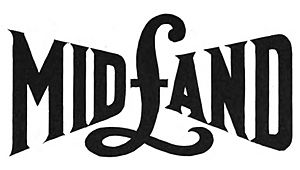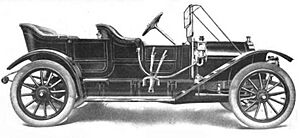Midland Motor Company facts for kids

Unusual Cars at Common Prices
|
|
| Industry | Automobile manufacturer |
|---|---|
| Fate | Bankrupt |
| Predecessor | Deere-Clarke Motor Car Co. |
| Founded | 1908 |
| Founder | Charles H. Pope, President |
| Defunct | 1913 |
| Headquarters | Moline, Illinois, |
| Products | Automobiles |
|
Production output
|
2,954 (1909-1913) |
The Midland Motor Company was an American company that made cars. It was located in Moline, Illinois. The company built cars during a time known as the brass era, which was from 1908 to 1913.
Company History
The Midland Motor Company started in 1908. It was formed from parts of another car company called Deere-Clark Motor Car Company. This happened after the well-known John Deere company decided to stop being involved in making cars.
Early Car Models
In 1910, Midland Motor Company made two main types of cars. These cars were known as the Model L and the Model K.
The Model L was a type of car called a touring car. It had a four-cylinder engine that made 40 horsepower. This car was quite long, with a wheelbase of 115 inches. It also had large wheels, about 34 inches tall. Buyers could choose between a car with a partial back seat or a sportier roadster style with a trunk. In 1911, this car cost about $2,100.
The Model K was also a touring car. It had a more powerful four-cylinder engine that made 50 horsepower. This model was even longer than the Model L, with a wheelbase of 118 inches. It had even bigger wheels, about 36 inches tall. People could choose a regular touring car body or a demi-tonneau style. In 1911, the Model K was a bit more expensive, costing around $2,250.
Advanced Engineering
Midland Motor Company used some smart ideas in how they built their cars. For example, the engine and the transmission were built together as one unit. This was a modern design for the time. Also, the parts that connected the engine to the wheels were covered. In 1912, the company even started making a car with a six-cylinder engine.
The End of Midland
In 1911, Charles Pope, who was the president of the company, retired. He passed away the next year. Sadly, the company ran into problems and went bankrupt in 1913. This was due to how the company was managed.
Images for kids
 | Aaron Henry |
 | T. R. M. Howard |
 | Jesse Jackson |




